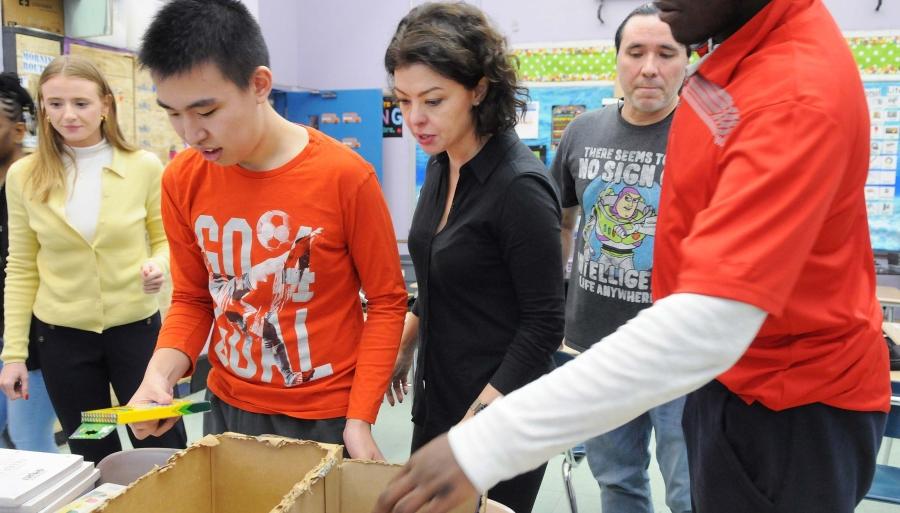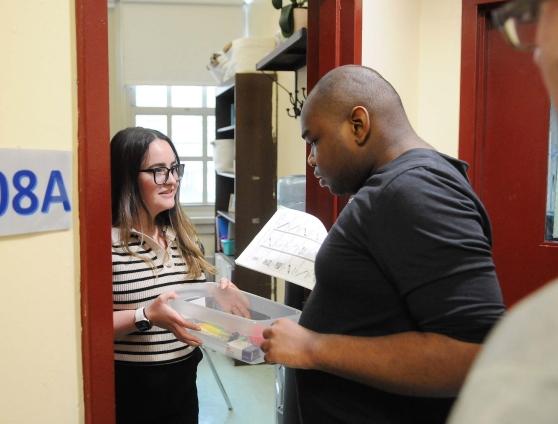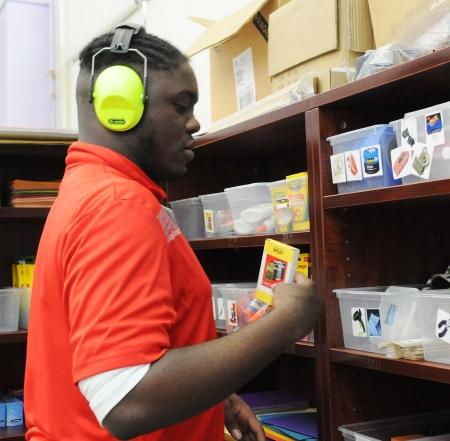Taking stock in students’ skills

Speech therapists Briana Maguire (left) and Larisa Kazanchieva (center) and paraprofessional Joe Cangelosi (right) guide students as they sort school supplies.

One of Leaderman's students delivers an order of supplies to teacher Miranda Young.

A student stocks supplies, using skills in motor planning, reading and verbal commu- nication that will be useful after graduation.
When teachers at P370, a District 75 program in Coney Island, need pencils, notebooks or other supplies for their classrooms, they don’t call the administrative office or check a storage closet. Instead, they fill out a laminated order form with a dry-erase marker and give it to the students in Steven Leaderman’s class.
These students, with Down syndrome, autism and other developmental disabilities, have been working for the past 2.5 years on sorting, storing and delivering school supplies. In doing so, the students are developing vocational and life skills that will be useful after they graduate, their teacher and speech therapists say.
“I know our kids are capable of doing things, and vocational education is the way for most of them,” said Leaderman, who is also the UFT chapter leader at P370. “Within this vocational program, there are also a lot of academic skills to learn — you’re doing both.”
When Leaderman launched the supplies program in September 2022, he created lesson plans alongside the vocational tasks of sorting and storing. Students learned the names of school supplies in the English language arts period. For the task of sorting, the approach was initially looser. “The first thing I did was just dump a bunch of supplies from a box on the table,” Leaderman said. “It was kind of chaotic.”
But through trial and error, Leaderman and the paraprofessionals in his classroom refined the task. Playing music helped the students stay calm and focused. He added colored arrows made of tape on the classroom floor to guide the students’ walking paths around the table where they would sort the supplies.
The real turning point, Leaderman said, came two months in, when the school’s two speech therapists, Larisa Kazanchieva and Briana Maguire, got involved.
Kazanchieva and Maguire work with students in one-on-one sessions and, each year, collaborate with teachers on “push-in sessions” where students work toward their speech and academic goals through a group activity in their classroom.
Speech goals at the time, said Kazanchieva, included “requesting items, labeling items and responding to questions pertaining to specific items.” Leaderman invited the speech team to work with him on the school supplies project. They introduced color-coding, encouraged verbal and device-assisted communication as part of the sorting task and helped Leaderman improve his lesson plans. Leaderman considers the speech team a “great help” to instruction. “They’re smart, they make me a better teacher and they make the kids better,” he said.
Now, when a shipment of school supplies arrives, the students descend on the table like an organizational tornado. They circle the pile, diligently sorting like with like, until each of the marked sections on its perimeter holds a neat stack of rulers, highlighters, notebooks or staples. They carry each stack to its corresponding home on the bookshelf in the corner of the classroom. When an order form arrives from another classroom, a student grabs a plastic box, reads the form, fills the box with the appropriate supplies and carries it to the correct classroom.
The three educators say the skills these tasks entail, which include motor planning, reading and verbal communication, will serve the students as they plan for their lives after graduation. “I see these kids working at CVS, working in the pharmacy. We want to see them working in the community,” said Kazanchieva.
Dwonna Johnson, the mother of one of the students, has noticed positive transformation in her son thanks to his participation in the supplies program. At home, the student offers to help without prompting. “He’ll ask if he can vacuum, clean up the living room or take the garbage out,” said Johnson. The student has also progressed in communication skills, “using his words more, communicating and asking questions about purchases when shopping for groceries or household items.”
“This opportunity is a blessing for the children to have,” said Johnson. “I feel positive and optimistic about his future.”
Maguire hopes that parents like Johnson and other educators of students with disabilities can learn from her work that “no matter what you’re doing, there are always opportunities to target goals.” While sorting and storing school supplies may seem like it’s “not a structured lesson,” it can become an opportunity for growth, and so can other tasks, like setting up a meal or shopping. “You can have the child interact, you can have them plan tasks,” she said. “Take those opportunities, and you’ll see progress.”
Thanks to his students’ hard work and his effective collaboration with the speech team, Leaderman sees growth and possibility in his District 75 classroom.
“Our kids can learn. They can do anything,” he said. “That’s the ultimate thing I want everyone to know. If you’re willing to put the work in and think outside the box, the sky’s the limit.”
